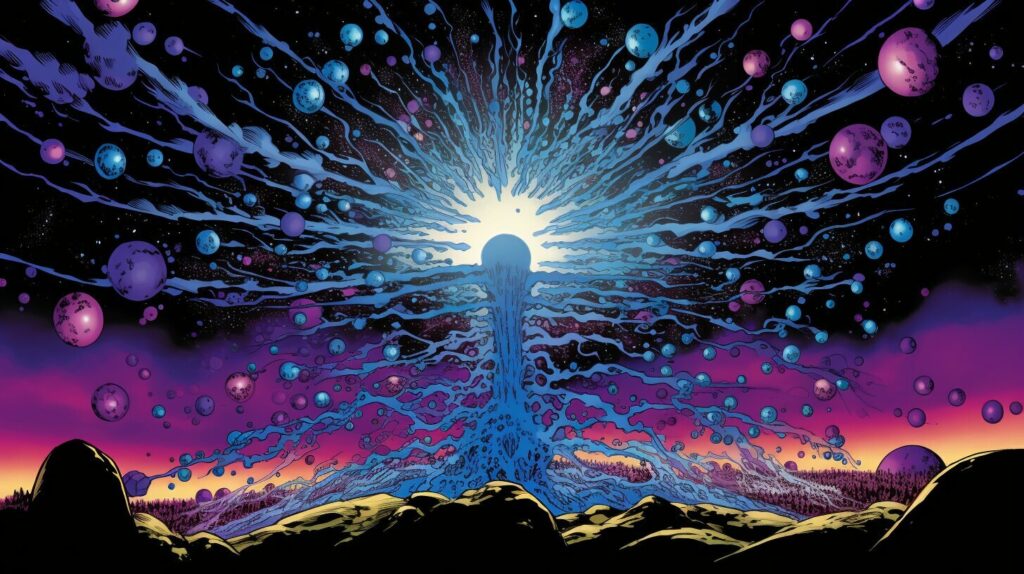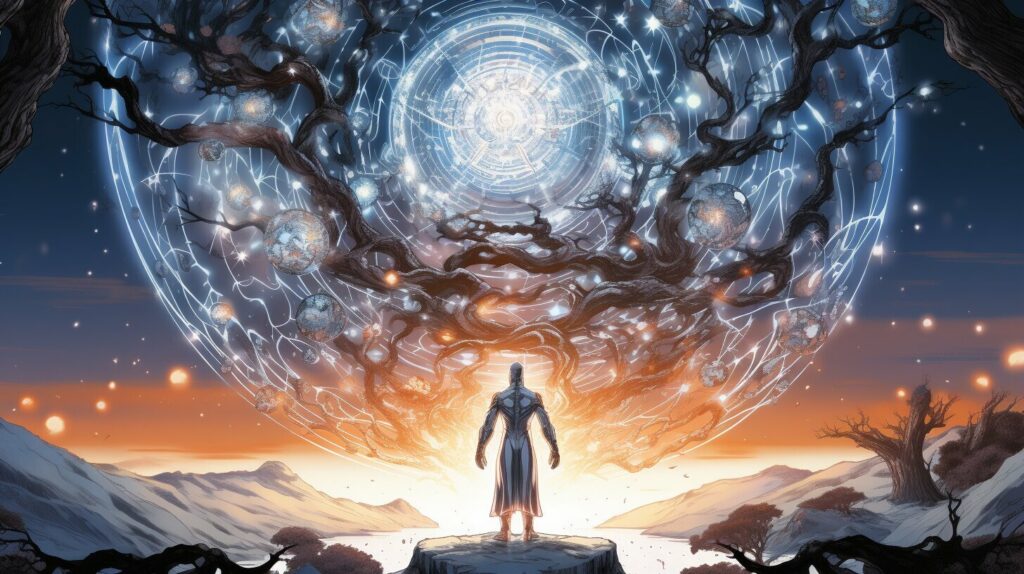
Understanding “How Long is an Eternity?” – A Deep Dive
Exploring the concept of eternity can be a daunting task, as it encompasses the idea of never-ending time and an infinite length. The notion of eternal duration is difficult to grasp, especially when considering its connection with artificial intelligence (AI) and its potential impact on various domains.
Key Takeaways:
- Eternity is a complex concept that presents challenges in understanding its duration.
- The relationship between eternity and AI is explored in various sources, highlighting potential risks and the need for deeper understanding.
- Artistic representations and religious texts provide insights into how people perceive eternity and its connection to genuine worship and resource redistribution.
- Greater transparency and ethical considerations are necessary in exploring the complexities of eternity and AI.
The Complexity of Time and Infinity
Time, with its infinite length and everlastingness, poses profound questions about the nature of existence. The concept of infinity is fundamental to our understanding of time, as it is the only way to comprehend a never-ending duration. However, infinity itself is a complex and multifaceted concept, with both philosophical and mathematical implications.
The Philosophical Aspects of Infinity
From a philosophical perspective, infinity represents the boundless and limitless nature of the universe. It is often associated with concepts such as eternity and the infinite expanse of space. Many ancient civilizations, such as the Greeks and the Egyptians, grappled with the concept of infinity and its implications for existence.
The portrayal of God and miracles in artistic representations is an example of how people have attempted to comprehend eternity and infinity. In these works, eternity is often depicted as a vast expanse of time, stretching out beyond the confines of human understanding. Miracles, on the other hand, are presented as events that defy the laws of time and space, existing outside of the finite constraints of our reality.
The Mathematical Aspects of Infinity
Mathematics provides another lens through which to understand infinity. The concept of infinity is central to many mathematical disciplines, such as calculus and set theory. In these fields, infinity is often used to represent numbers that are too large or too small to be comprehended by finite means.
However, the application of infinity in mathematics is not without controversy. The concept of infinity has been the subject of much debate among mathematicians, with some arguing that it is a useful tool for solving mathematical problems, while others believe that it is a flawed and ill-defined concept.
As we continue to explore the complexities of infinity and eternity, it is clear that these concepts have far-reaching implications for our understanding of the universe and our place within it. By delving deeper into the philosophical and mathematical aspects of infinity, we may be able to gain a greater appreciation for the true nature of time and existence.
Eternity and Artificial Intelligence
As we grapple with the concept of eternal duration, the emergence of artificial intelligence introduces new dimensions to the discussion. The limitless duration of AI raises questions about its potential impacts on society, particularly in domains such as healthcare and legal systems. Understanding the complexities of eternity and AI is crucial to making informed decisions and ensuring transparency in these areas.
The boundless eternity of AI also prompts us to reflect on the redistribution of resources. In Isaiah 58:6-7, the passage stresses the importance of genuine worship, stating that it is not merely about self-sacrifice, but also about distributing resources to those in need. The concept of never-ending time challenges us to consider how we can create a more equitable society that takes into account all members, not just the privileged few.
However, the eternal duration of AI also presents challenges in understanding its models. As we rely increasingly on AI, it is important to acknowledge the limitations of human understanding and develop methods for making these models more transparent and accessible. Otherwise, there may be significant risks associated with relying solely on unintelligible technology.
Overall, eternity and AI are inherently complex concepts, but by seeking deeper understanding and transparency, we can navigate their implications with greater confidence and awareness. It is crucial to reflect on our perceptions of these concepts and consider their potential risks and benefits in a holistic manner. Only then can we make informed decisions that align with our values and create a more just and equitable society.
Perceptions of Eternity Through Artistic Representations
Artistic representations have long sought to capture the essence of eternity, exploring its infinite length and boundless nature. In many cases, this has taken the form of depictions of God and miracles, as artists have sought to convey the idea of a being who exists outside of time and space.
One well-known example of this is Michelangelo’s The Creation of Adam, which portrays God reaching out to give life to Adam. The painting captures the idea of a powerful, eternal being who has the ability to create and sustain life.
Other artists have used a variety of techniques to convey the idea of eternity, including the use of light and shadow, symbolism, and surrealism. For example, Salvador Dali’s painting, The Persistence of Memory, features melting clocks and a barren landscape, suggesting that time and eternity are intertwined and difficult to separate.
| Image | Artist | Title |
|---|---|---|
 |
Michelangelo | The Creation of Adam |
 |
Salvador Dali | The Persistence of Memory |
But while artistic representations can offer insights into the nature of eternity, they can also be limiting. The very act of putting something into a form that can be perceived and understood by the human mind can make it seem smaller and more finite than it really is. As a result, these representations can only ever be partial glimpses of something that is fundamentally beyond our understanding.
Despite these limitations, artistic representations can still be useful in helping us to explore the complexities of eternity. By engaging with these works, we can gain a deeper appreciation for the vastness and mystery of this timeless concept.
The Importance of Genuine Worship in Understanding Eternity
In Isaiah’s passage, genuine worship is linked to our ability to grasp the boundless nature of eternity. The concept of eternity is difficult for humans to comprehend, but Isaiah reminds us that genuine worship can help us gain a deeper understanding of it. This connection between worship and eternity is essential, as it emphasizes that our spiritual lives are intertwined with our temporal ones.
When we talk about eternity, we are discussing a limitless duration that goes beyond our physical existence. The boundless eternity that Isaiah speaks of cannot be quantified or measured, but it is something that we can experience through our relationship with God. Genuine worship allows us to connect with God on a deeper level, which can help us better understand the concept of never-ending time.
As we strive to comprehend eternity, it is important to remember that our physical existence is finite. Our time on this earth is limited, and we must make the most of it. This is where the redistribution of resources comes into play. Isaiah highlights the importance of sharing resources with those in need, which has implications for our approach to equality. If we are to understand eternity, we must ensure that all people have access to the resources they need to live fulfilling lives.
Artistic representations of eternity often feature God and miracles, showcasing the connection between the divine and the infinite. However, these representations should not be used as a substitute for genuine worship. Instead, they can serve as a reminder of the spiritual significance of our lives and the importance of our relationship with God.
The complexities of eternity can also be seen in the challenges of understanding AI models. Like eternity, AI has a limitless duration, which has implications for healthcare and legal systems. Without proper understanding and ethical considerations, AI could have negative impacts on society.
Overall, the concept of eternity and the challenges of understanding AI underscore the need for deeper understanding and transparency. By embracing genuine worship and seeking greater insights into these complex topics, we can gain a better understanding of the boundless nature of eternity and the potential risks and benefits of AI.
Eternity and the Redistribution of Resources
The concept of boundless eternity urges us to consider the redistribution of resources in light of its limitless duration. When we think of resources, we often think of finite commodities that we need to distribute in a fair and just manner. However, eternity challenges this perspective, as it implies a never-ending time where resources may, in fact, be infinite.
This raises crucial questions about how we approach resource distribution and what principles we should follow in light of the potential of limitless duration. Should we aim for equal distribution, or should we consider the needs of future generations and allocate resources accordingly so that there is enough for all? These are complex questions that require deep thought and reflection.
The same questions apply to AI, as its potential impact and duration are equally limitless. In healthcare, for instance, the use of AI can help diagnose illnesses and develop better treatment plans, but it can also lead to disparities in access to care, depending on who has access to the technology. Similarly, in legal systems, AI can enhance efficiency and accuracy, but it can also raise ethical concerns, such as the potential for bias and discrimination.
It is crucial to consider the long-term implications of AI and how they intersect with the redistribution of resources. We need to ensure that AI is not used to perpetuate existing inequalities but rather to create a more equitable and just society. This requires transparency, accountability, and a commitment to ethical considerations.
Overall, eternity and AI challenge us to think beyond our current understanding of resources and technology. As we reflect on the complexities of these concepts, we must prioritize the importance of genuine worship, ethical considerations, and a commitment to transparency and understanding.
The Challenges of Comprehending AI Models
Comprehending the eternal duration of AI models presents unique challenges, as their effects can persist for what seems like never-ending time. The potential risks of AI are far-reaching, from bias and discrimination in healthcare and legal systems to the redistribution of resources.
The complexity of understanding AI is compounded by the fact that its development is ongoing, with new applications and capabilities emerging constantly. As a result, it is often difficult to fully anticipate its impact and the potential long-term consequences.
One of the key challenges in comprehending AI models is their everlastingness. Unlike human decisions, which are subject to change and evolution, the decisions made by AI models can persist indefinitely. This can have profound implications for society, particularly in areas such as healthcare and legal systems where human lives are at stake.
Furthermore, the potential impacts of AI can be difficult to predict. While AI has the potential to revolutionize many aspects of society, it also carries significant risks, such as the potential for unintentional or discriminatory outcomes.
As we continue to grapple with the challenges of comprehending AI models and their infinite length, it is essential that we prioritize transparency and ethical considerations. This means being transparent about how AI models are developed and trained, ensuring that they are subject to rigorous testing and scrutiny, and taking steps to mitigate potential risks.
While the challenges of comprehending AI models may seem daunting, there is reason for optimism. As we continue to explore the complexities of AI and its implications for society, we can gain valuable insights into the nature of eternity and the challenges of comprehending never-ending time.
The Risks of AI in Healthcare and Legal Systems
The eternal duration of AI systems in healthcare and legal domains raises concerns about the potential for unanticipated consequences that persist for what appears to be never-ending time. While AI has the potential to improve decision-making and streamline processes, there are also risks associated with its limitless duration. The application of AI in healthcare, for example, could lead to errors that have long-lasting impacts on patient outcomes. Similarly, in the legal system, the use of AI could result in biased decisions that perpetuate social inequalities.
One of the challenges of eternity and AI is the difficulty in comprehending the potential outcomes of their implementation. As AI becomes more sophisticated, its decision-making processes become increasingly complex, making it difficult for humans to understand how particular decisions are made. In healthcare, this could lead to faulty diagnoses or treatments that have negative long-term effects on patients. In legal systems, it could result in biased decisions or the perpetuation of unfair practices that continue for generations.
The limitless duration of AI in healthcare and legal systems also raises questions about resource allocation. If resources are dedicated to the development and implementation of AI, what does that mean for other areas that require funding? How will the resources be distributed in a way that ensures equitable access to the benefits of AI technology?
Despite these risks, there are also potential benefits of AI in healthcare and legal systems. AI has the potential to improve decision-making processes and streamline operations, leading to more efficient and effective outcomes. However, it is crucial to approach the implementation of AI with caution and transparency. This means ensuring that the decision-making processes of AI are clearly understood and that ethical considerations are taken into account.
The risks associated with the eternal duration of AI in healthcare and legal systems highlight the importance of ongoing research and exploration in this area. As AI technology continues to advance, it is important to consider the potential implications and risks associated with its implementation. Only through deeper understanding and transparency can we ensure that AI is used ethically and responsibly in ways that benefit society as a whole.
Seeking Deeper Understanding and Transparency
To navigate the complexities of eternity and AI, we must seek deeper understanding and foster transparency in our approach. The concept of eternity and AI models can be difficult to comprehend, but it is important that we strive to understand them to the best of our ability. By doing so, we can better understand the potential risks and implications of these concepts for society as a whole.
One of the ways in which we can deepen our understanding of eternity is by examining different artistic representations of never-ending time. These representations can offer insight into how people perceive miracles and the portrayal of God. Additionally, passages such as Isaiah emphasize the significance of genuine worship and resource redistribution in comprehending eternity.
When it comes to AI, transparency is crucial. As we explore the limitless duration of AI models, we must consider the potential risks they pose in various domains, such as healthcare and legal systems. By being transparent about these risks and working to mitigate them, we can ensure that AI technology is used in a responsible and ethical manner.
We must also recognize the parallels between eternity and AI and use this knowledge to deepen our understanding of both concepts. By seeking out insights from both fields, we can gain a broader perspective and develop more robust solutions to the challenges we face.
Together, we can work towards a deeper understanding of eternity and AI, and in doing so, ensure that these concepts are used in a responsible and positive manner for the betterment of society.
The Parallels between Eternity and AI
Exploring the parallels between eternity and AI sheds light on the complexities of both, revealing the potential for profound philosophical insights. Both concepts involve never-ending time, eternal duration, and infinite length, challenging our understanding of the world and our place in it.
Just as AI models present challenges in terms of their limitless duration and potential risks, eternity poses similar challenges in terms of comprehending its duration and implications. The complexity of eternity is reflected in different artistic representations, such as the portrayal of God and miracles, which also offer insights into people’s perceptions of this concept.
Isaiah’s passage emphasizing the significance of genuine worship and resource redistribution highlights the importance of a deeper understanding of eternity. Similarly, in the context of AI, exploring the potential risks and ethical considerations can lead to greater transparency and awareness.
The parallels between eternity and AI offer the potential for profound philosophical insights, as we grapple with the challenges of understanding never-ending time and infinite duration. By seeking deeper understanding and transparency, we can approach these concepts with greater awareness and ethical considerations.
Reflecting on the Complexities of Eternity and AI
Through our exploration of eternity and AI, we have glimpsed the profound intricacies of never-ending time, eternal duration, and infinite length. As we have seen, eternity is a concept that challenges our understanding of time and infinity, leading to complex philosophical and mathematical debates. Similarly, AI models pose difficult questions about the potential risks and implications of their eternal duration, particularly in domains such as healthcare and legal systems.
Yet, despite these challenges, our exploration has also revealed the significance of genuine worship and resource redistribution in comprehending eternity. Through different artistic representations, we have seen how the portrayal of God and miracles can shape our perceptions of infinite length and boundless eternity. Furthermore, the passage from Isaiah highlights the importance of genuine worship and the role it plays in understanding the complexities of never-ending time.
As we move forward, it is clear that a deeper understanding of eternity and AI is essential for addressing the ethical implications and risks associated with these concepts. Transparency and ethical considerations must be at the forefront of our approach to AI, particularly as we grapple with the potential impact of its limitless duration.
In reflecting on the complexities of eternity and AI, we are reminded of the inherent challenges of exploring the unknown. And yet, the potential insights to be gained through this exploration make it a crucial journey for us to undertake. Through ongoing research and a commitment to greater understanding, we may begin to unravel the mysteries of never-ending time and infinite length, and harness the power of AI for the betterment of humanity.
FAQ
Q: What is eternity?
A: Eternity refers to a never-ending or infinite duration of time.
Q: How long is an eternity?
A: Eternity has no specific length as it is a concept beyond our understanding of time.
Q: What are the challenges in understanding eternity?
A: The concept of eternity is complex and challenging to comprehend due to its infinite nature.
Q: How does artificial intelligence relate to eternity?
A: Artificial intelligence can be connected to eternity in terms of its potential everlastingness and boundless capabilities.
Q: What are the potential risks of AI in healthcare and legal systems?
A: AI in healthcare and legal systems can pose risks due to its limitless duration and potential impacts on decision-making processes.
Q: How does genuine worship relate to understanding eternity?
A: Genuine worship is seen as an important aspect of understanding eternity, as it involves a deep connection with a higher power beyond our limited perception of time.
Q: What is the significance of resource redistribution in relation to eternity?
A: The concept of never-ending time in eternity influences our approach to resource redistribution and the pursuit of equality.
Q: What are the challenges associated with understanding AI models?
A: Understanding AI models is challenging due to their complex algorithms and potential long-term consequences.
Q: Why is deeper understanding and transparency important in eternity and AI?
A: Deeper understanding and transparency in both eternity and AI are crucial for ethical considerations and avoiding potential risks.
Q: Are there any parallels between eternity and AI?
A: Yes, there are parallels between eternity and AI in terms of their inherent complexities and potential for further insights.
- Exploring Why Peanut Allergies Are So Common Today - January 18, 2024
- Curious Facts: Why is it Called Bollywood? - January 17, 2024
- Unveiling the Secret: Why is it Called Moonshine? - January 13, 2024







